Related Research Articles
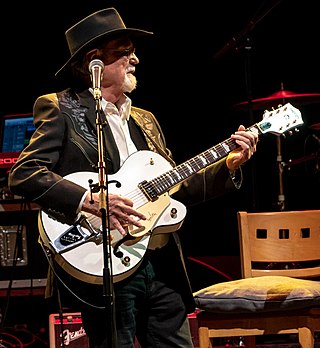
Duane Eddy is an American rock and roll guitarist. In the late 1950s and early 1960s, he had a string of hit records produced by Lee Hazlewood, which were noted for their characteristically "twangy" sound, including "Rebel-'Rouser", "Peter Gunn", and "Because They're Young". He had sold 12 million records by 1963.
"Mack the Knife" or "The Ballad of Mack the Knife" is a song composed by Kurt Weill with lyrics by Bertolt Brecht for their 1928 music drama The Threepenny Opera. The song tells of a knife-wielding criminal of the London underworld from the musical named Macheath, the "Mack the Knife" of the title.

Sugar, Sugar is a song written by Jeff Barry and Andy Kim. It was originally recorded by the Archies, a fictional band of studio musicians linked to the 1968–69 US Saturday morning TV cartoon The Archie Show, inspired by the Archie Comics. In the autumn of 1969 the single topped both Billboard's Hot 100 and the UK Singles Chart, ranking number one for the year in both America and Britain. “Sugar, Sugar” is the most successful bubblegum pop single of all time, and is widely regarded as the apotheosis of the late-1960s/early-1970s bubblegum music genre. In mid-1970 R&B/soul singer Wilson Pickett achieved success on both the US soul and pop charts with a cover version.

Sander Lloyd Nelson was an American drummer. Nelson, one of the best-known rock and modern jazz drummers of the late 1950s and early 1960s, had several solo instrumental Top 40 hits and released over 30 albums. He was a session drummer on many other well-known hits. He lived in Boulder City, Nevada, where he continued to experiment with music on keyboards and piano.
"Come Softly to Me" is a popular song recorded by The Fleetwoods, composed of Gretchen Christopher, Barbara Ellis, and Gary Troxel, who also wrote it. The original title was "Come Softly", but was changed en route to its becoming a hit. Bob Reisdorf, the owner of Dolphin Records, which in 1960 changed to Dolton Records, was responsible for the title change. He thought that "Come Softly" might be too obvious and considered risqué, so he had it changed to "Come Softly to Me." The title phrase never appears in the song's lyrics.
"Theme from A Summer Place" is a song with lyrics by Mack Discant and music by Max Steiner, written for the 1959 film A Summer Place, which starred Sandra Dee and Troy Donahue. It was recorded for the film as an instrumental by Hugo Winterhalter. Originally known as the "Molly and Johnny Theme", this lush extended cue, as orchestrated by Murray Cutter, is not the main title theme of the film, but an oft-heard secondary love theme for the characters played by Dee and Donahue. The theme has become a canonical representation of the easy listening genre, and is considered by some to be the definitive easy listening track of all time.
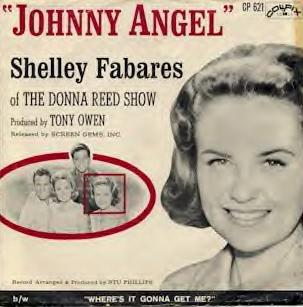
"Johnny Angel" is a song written and composed by Lyn Duddy and Lee Pockriss. The song was originally recorded by both Laurie Loman and Georgia Lee, but those two versions were not successful. It first became a popular hit single when it was recorded by Shelley Fabares in the fall of 1961; she took it to No. 1 on the Billboard Hot 100 Chart when the song was released in 1962. In the same year, British singer Patti Lynn had a moderate hit on the UK Singles Chart with her cover of the song. The American pop music duo The Carpenters recorded "Johnny Angel" in 1973 as part of a medley of oldies on side two of their album Now & Then.
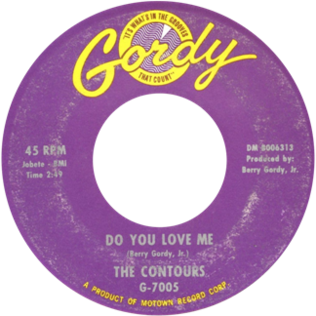
"Do You Love Me" is a rhythm and blues song recorded by the Contours in 1962. Written and produced by Motown Records owner Berry Gordy Jr., it appeared twice on the Billboard Hot 100 chart, reaching numbers three in 1962 and eleven in 1988.

"Walk On By" is a song composed by Burt Bacharach, with lyrics by Hal David, for singer Dionne Warwick in 1963. The song peaked at number 6 on the US Billboard Hot 100 and number 1 on the Cash Box Rhythm and Blues Chart In June 1964 and was nominated for a 1965 Grammy Award for the Best Rhythm and Blues Recording. Isaac Hayes recorded the song five years later, in 1969, and reached number 30 on the Hot 100 chart and number 13 in the R&B charts with his version. "Walk On By" has since charted numerous times in various countries, with wildly different arrangements.

"Let It Be Me" is a popular song originally published in French in 1955 as "Je t'appartiens" interpreted by Gilbert Bécaud. It became popular worldwide with an English version by the Everly Brothers and later with the duet by Betty Everett and Jerry Butler.
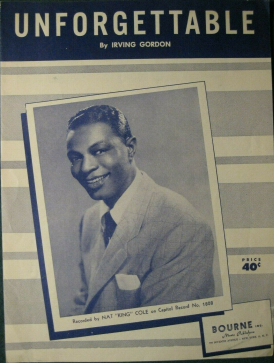
"Unforgettable" is a popular song written by Irving Gordon. The song's original working title was "Uncomparable"; however, the music publishing company asked Gordon to change it to "Unforgettable". The song was published in 1951.

"Living Doll" is a song written by Lionel Bart made popular by Cliff Richard and the Shadows in 1959. It was the top selling single in the UK in 1959. It has topped the UK charts twice: in its original version in 1959 and a new version recorded in 1986 in aid of Comic Relief. It is one of the few songs released by an English singer to chart on the American Billboard charts before the British Invasion occurred.

"Killer" is a song by British DJ and record producer Adamski. It was written by Adamski and British singer-songwriter Seal, who also provided vocals. "Killer" reached number one on the UK Singles Chart and spent four weeks at the top in May and June 1990. The single sold over 400,000 copies in the UK, earning it gold certification. It also reached number one in Belgium and Zimbabwe and number two in the Netherlands and West Germany.
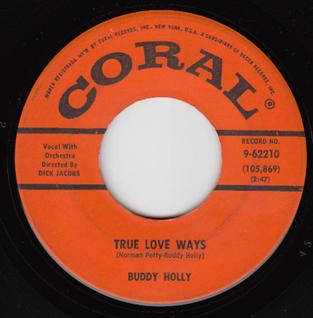
"True Love Ways" is a song attributed to Norman Petty and Buddy Holly. Buddy Holly's original was recorded with the Dick Jacobs Orchestra in October 1958, four months before the singer's death. It was first released on the posthumous album The Buddy Holly Story, Vol. 2, in March 1960. The song was first released as a single in Britain in May 1960, reaching number 25 on the UK Singles Chart. It was released the following month in the US, but did not make the charts. In 1988, a UK re-release of the recording by MCA, the single reached no. 65 on the UK singles chart in a 5 week chart run.
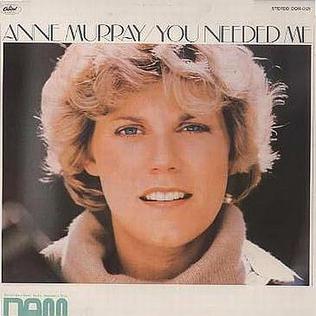
"You Needed Me" is a song written by Randy Goodrum, who describes it as being about "unconditional undeserved love". It was a number-one single in the United States in 1978 for Canadian singer Anne Murray, for which she won a Grammy Award. In 1999, Irish pop band Boyzone recorded a hit cover of the song that reached number one on the UK Singles Chart.
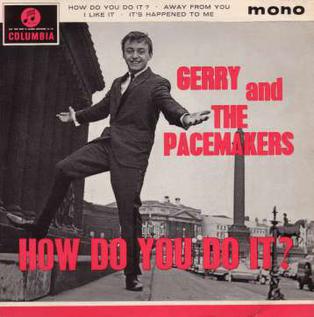
"How Do You Do It?" is the debut single by Liverpudlian band Gerry and the Pacemakers. It was written by Mitch Murray. The song reached number one in the UK Singles Chart on 11 April 1963, where it stayed for three weeks.

"Loving You Is Sweeter Than Ever" is a 1966 song written by Ivy Jo Hunter and Stevie Wonder. It was performed by the Four Tops via the Motown label. In addition to co-writing the song, Wonder also instrumentally contributed drums to the track.
"It's Late" is a song written by Dorsey Burnette, who recorded it on August 28, 1958. However, it was not released and its first appearance was on a compilation album by Imperial Records in 1980. It is better known for its release as a single by Ricky Nelson in February 1959, subsequently reaching number 3 in the UK, number 9 on the Billboard Hot 100, and number 30 on the R&B chart that year. The song is featured on the 1959 album Ricky Sings Again.

"Don't Make My Baby Blue" is a song by Frankie Laine, released as a single in March 1963. It peaked at number 51 on Billboard Hot 100. It was later covered by the Shadows, who had a hit with it in the UK.
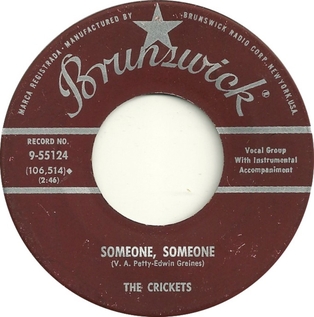
"Someone, Someone" is a song by American rock and roll band the Crickets, released in March 1959 as the B-side to "Love's Made a Fool of You". However, the song is better known for the version by British beat group Brian Poole and the Tremeloes, which became a top-ten hit in the UK in 1964.
References
- 1 2 3 4 5 "Teen Beat". Discogs. 1959.
- ↑ "Plays Teen Beat". Discogs. 1960.
- 1 2 Sandy Nelson (1938-12-01). "Sandy Nelson - Awards". AllMusic. Retrieved 2013-03-30.
- ↑ Murrells, Joseph (1978). The Book of Golden Discs (2nd ed.). London: Barrie and Jenkins Ltd. p. 116. ISBN 0-214-20512-6.
- ↑ "The Official Charts Company - Teen Beat (song)". The Official Charts Company. 6 May 2013.
- ↑ "Billboard Top 100 - 1959". Archived from the original on 2014-01-02. Retrieved 2011-01-13.
- ↑ Brown, Tony, Jon Kutner & Neil Warwick, The Complete Book of the British Charts: Singles and Albums, Omnibus Press, London, 2002 p.712